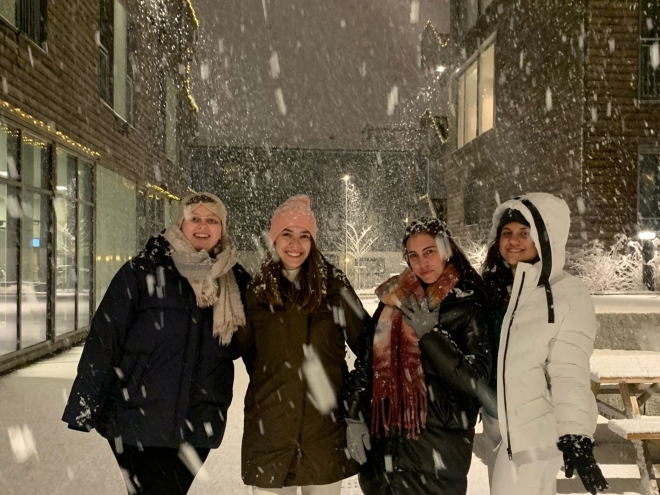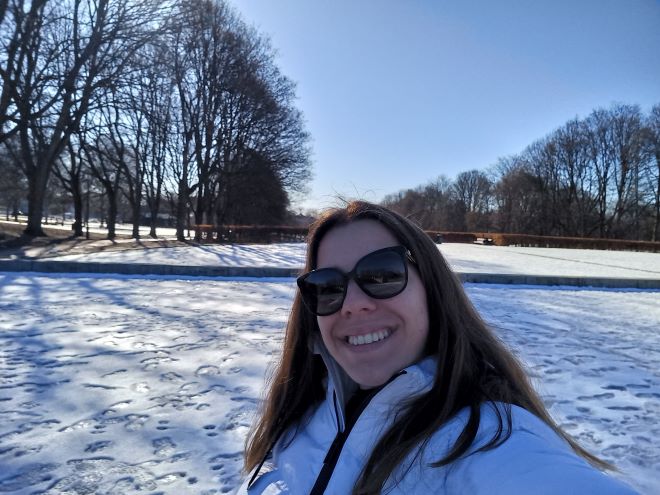Tell me about your home university?
I'm a nursing student at the university São José de Cluny on Madeira. We have a basic program for nurses, it’s four years. It’s what you call bachelor. We also have courses to specialize in nursing. In Portugal, we go through different areas during the different years. The third year started with paediatrics and obstetrics. And now, the second semester, it's only mental health, and we have another class after we finish the practice.
Tell us about Fontenehuset?
We don't have anything like Fontenehuset in Portugal. It's a different concept. I haven’t heard about it before I got here. They work with rehabilitation, and that's very nice because the staff and the members have the same responsibilities. They all have tasks, and they do the tasks together. Sometimes when people are struggling with mental health problems, if they are given a purpose or a simple task to do, they feel valued. Sometimes it's a victory for the person just to get out of the bed, take a shower and go there. I think we should follow the concept of Fontenehuset. I know there are some in Spain, but in Portugal we don't have it. In Madeira we have two units for people with mental health problems, one for men and one for women. There is an emergency care and also long term care. But a place where they work with rehabilitation, we don't have anything like that.
“Sometimes when people are struggling with mental health problems, if they are given a purpose or a simple task to do, they feel valued. Sometimes it's a victory for the person just to get out of the bed, take a shower and go there. I think we should follow the concept of Fontenehuset.”
A different journey
Differences between Norway and Portugal?
It's been a different journey here in Norway. In Portugal we work with people at the hospital. Here they work in the community, with people in their homes. My other friends are doing an internship at a nursing home, and they were taking care of patients in their own homes. I hope it will change one day in Portugal, because working in the community is so much better for the patient. And that’s a thing that I really appreciate here in Norway.
And how was it arriving in Norway?
We arrived on the 28th of March and when we arrived, we saw snow from the plane. We were like, oh, my God, it's really happening! Camilla (international coordinator) had told us that in Fredrikstad we probably won't have snow. But the day we arrived it started snowing. So, we just brought our bags to the room and then we went back together with a nursing student from Germany. She came downstairs with us, and we started making snow angels! It was very funny. We started our internships on the 12th of April, so we had one week before we started. So we went to Oslo, because we have friends there. And we went to see a lot of places. Madeira is a very small island, and Norway is huge. And it was very beautiful to see everything with the snow. Because in Madeira we don't have snow, it's ice once or twice a year. And it's not that cold.

New experiences
Do you already know which line of care work you want to continue in when you are back in Portugal?
Yeah, I’m a part of the Red Cross in Madeira. I'm a volunteer. And I love working in the emergency area, but I also love pediatrics, so I don't really know. I think when I finish the nursing degree, I really want to go to a hospital because I think we can develop a lot of things, like how we practice and also the communication, which is essential to the nursing cares. But in Portugal we can only specialize after two years of work. So I have two years to think about it.
What kind of work did you do at the Red Cross?
It's like the ambulance. We go out to people when they ask for help. We just help them with what they need, and if it's necessary we take them to the hospital. I really love working there. And I think it's very important when things become urgent, that we stop and look at the patient and see their needs. Because sometimes during emergencies, patients get very stressed or scared. So it's very important to remember to not only look at the problem, but to look to the entire person in front of us.
“And I think it's very important when things become urgent, that we stop and look at the patient and see their needs. Because sometimes during emergencies, patients get very stressed or scared. So it's very important to remember to not only look at the problem, but to look to the entire person in front of us.”
What are the best experiences you are taking home with you to Portugal?
I think it's the way you work with people here, especially dealing with mental health. I have asked the nurses here and people in general, and there is no long-term care in the hospitals for patients struggling with mental health. It's only in emergencies they come to the hospital. Instead, they are sent to their own homes, and they get medication and have therapies. And I think that’s one of the most challenging things, but also a very important thing, we can improve in our nursing system in Portugal. In Norway the number of the patients are distributed equally on each nurse, so that the nurses aren't getting too much work. In Portugal we sometimes have a lot of patients to one nurse, and sometimes you need to work fast because there is no time. So, everything is very stressful during the shifts.
What differences in culture have you have you experienced?
One thing where I can really see the difference is in Madeira, and in Portugal, when we go out on the streets we say hi, even to strangers. Also in the student housing. Sometimes we are smiling or just saying hello to the person passing us. But here sometimes people just turn away. That it one thing that I thought was a little strange in the beginning.
Have you made any new friends?
So we have a girl from Germany. We have two girls from Belgium. And we met two girls from Austria. So all different cultures. One day we went to the bowling (organized by The Interational Office) and it was very nice because we all shared experiences from each country.

Why choose Norway?
Why did you end up choosing Norway?
Initially I didn't want to come here because of the language. I was very scared about learning two languages at the same time. But then my friends from my class wanted to go to Norway. So we just thought: we have each other. Let's go and everything will be alright. And I think my English is not perfect, but I think I'm improving my skills in language.
Would you recommend it to other students who are thinking about coming?
Yes, if you have the opportunity to go to a different place, why not? You will learn a lot, not only about the culture, but in this case the health system and see how important it is to work in different ways with the patient. And how you can change something in your country? I think if all of us try to change something, we will do great things in Portugal. We met a lot of people and it's a very beautiful country! We have been to many different places and we love all of it. And Fredrikstad is very beautiful too. With snow, or without snow. It's very beautiful now in the spring, the flowers are blooming. I thinks it’s worth it.
